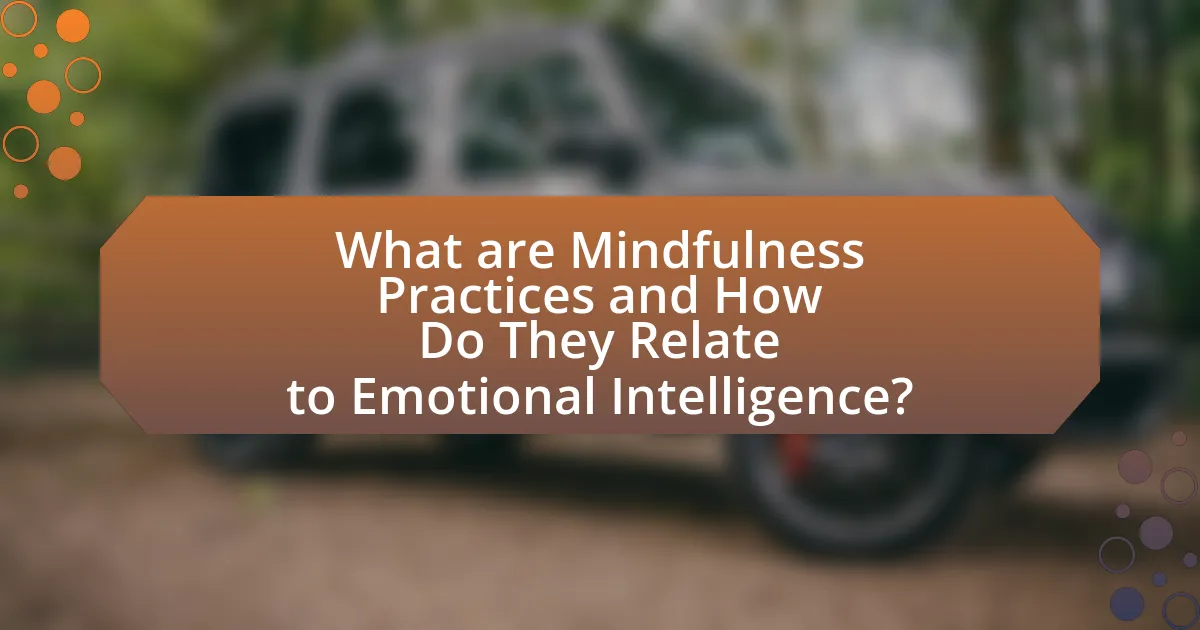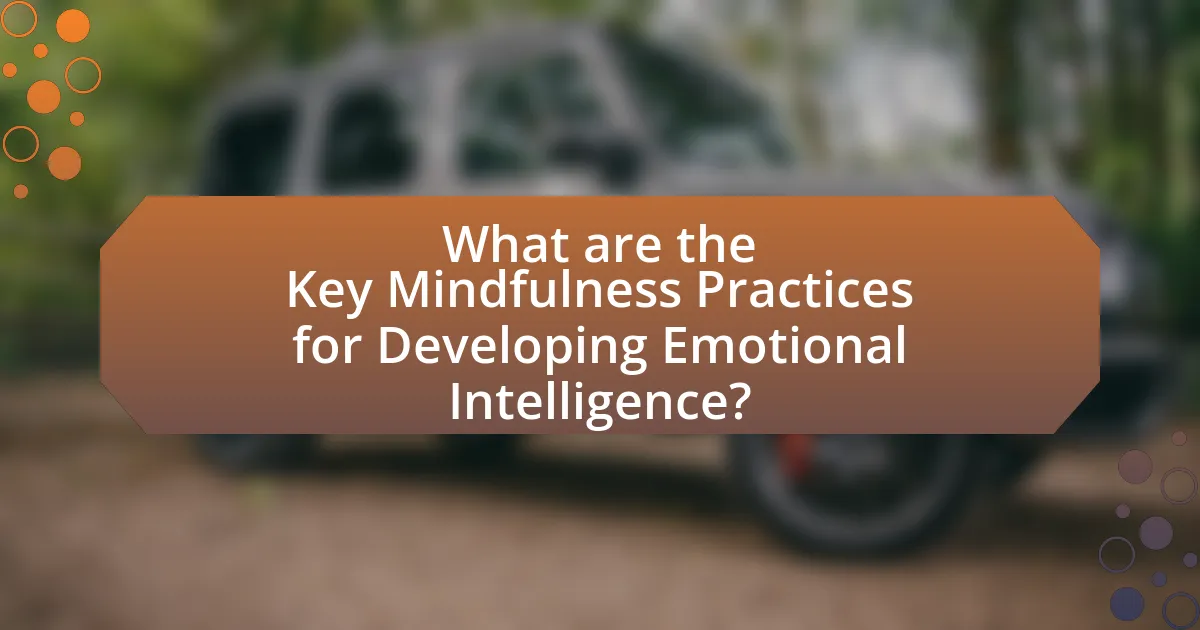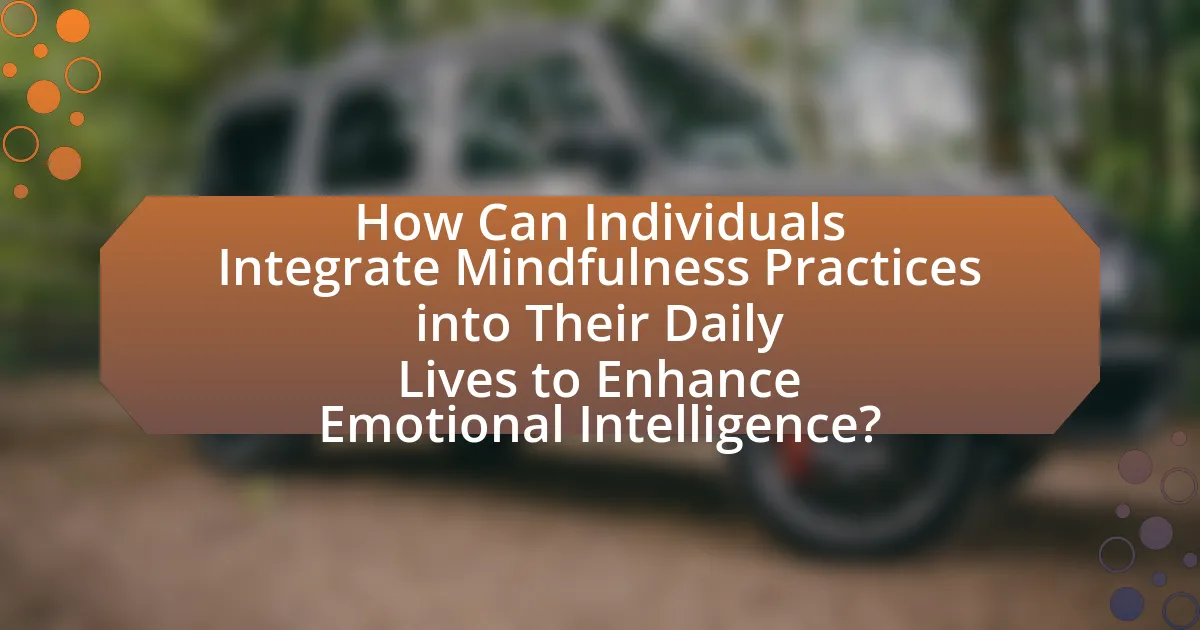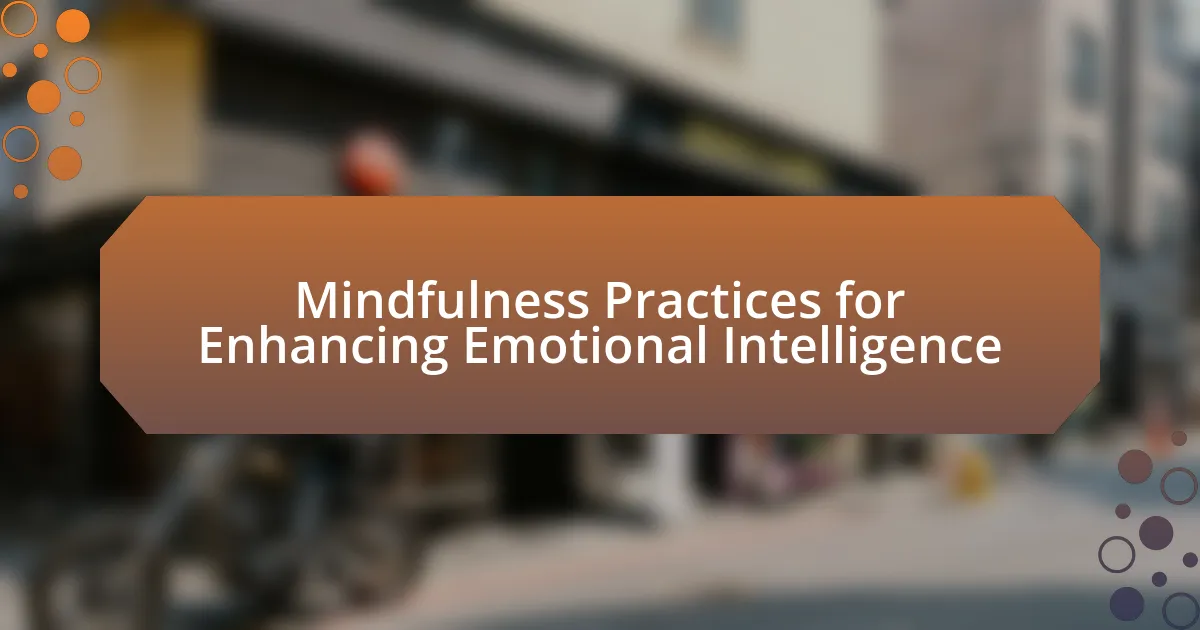Mindfulness practices are techniques designed to enhance focused awareness on the present moment, which significantly contributes to the development of emotional intelligence. This article explores how mindfulness practices, such as meditation and mindful breathing, foster self-awareness, emotional regulation, and empathy—key components of emotional intelligence. It discusses specific techniques that improve emotional awareness and regulation, the importance of emotional intelligence in personal and professional contexts, and practical steps for integrating mindfulness into daily life. Additionally, it addresses common challenges individuals may face when adopting mindfulness practices and offers strategies to maintain consistency and maximize benefits.

What are Mindfulness Practices and How Do They Relate to Emotional Intelligence?
Mindfulness practices are techniques that promote focused awareness on the present moment, often through meditation, breathing exercises, and mindful observation. These practices enhance emotional intelligence by fostering self-awareness, self-regulation, and empathy, which are key components of emotional intelligence. Research indicates that individuals who engage in mindfulness practices demonstrate improved emotional regulation and greater empathy, as evidenced by studies showing that mindfulness training can lead to significant increases in emotional intelligence scores. For instance, a study published in the journal “Personality and Individual Differences” found that participants who practiced mindfulness exhibited higher levels of emotional intelligence compared to those who did not engage in such practices.
How can mindfulness practices enhance emotional intelligence?
Mindfulness practices enhance emotional intelligence by fostering greater self-awareness and emotional regulation. Engaging in mindfulness techniques, such as meditation and focused breathing, allows individuals to observe their thoughts and feelings without judgment, leading to improved recognition of their emotional states. Research indicates that mindfulness training can significantly increase emotional awareness and empathy, which are critical components of emotional intelligence. A study published in the journal “Emotion” by Keng, Smoski, and Robins (2011) found that mindfulness practices correlate with higher emotional intelligence scores, demonstrating that individuals who regularly practice mindfulness are better equipped to understand and manage their emotions and the emotions of others.
What specific mindfulness techniques are effective for emotional intelligence?
Mindfulness techniques that are effective for enhancing emotional intelligence include mindful breathing, body scan meditation, and mindful observation. Mindful breathing helps individuals regulate their emotions by focusing on the breath, which can reduce stress and increase awareness of emotional responses. Body scan meditation promotes awareness of physical sensations and emotional states, allowing individuals to recognize and process their feelings more effectively. Mindful observation encourages individuals to observe their thoughts and emotions without judgment, fostering greater self-awareness and empathy towards others. Research indicates that these techniques can improve emotional regulation and interpersonal relationships, which are key components of emotional intelligence.
How do mindfulness practices influence emotional regulation?
Mindfulness practices enhance emotional regulation by increasing awareness of emotional states and promoting non-reactive responses. Research indicates that individuals who engage in mindfulness techniques, such as meditation and focused breathing, develop greater emotional awareness and the ability to observe their thoughts and feelings without immediate judgment or reaction. A study published in the journal “Emotion” by Keng, Smoski, and Robins (2011) found that mindfulness training significantly improved participants’ ability to regulate emotions, leading to reduced emotional reactivity and increased emotional resilience. This evidence supports the assertion that mindfulness practices are effective tools for enhancing emotional regulation.
Why is emotional intelligence important in personal and professional contexts?
Emotional intelligence is crucial in personal and professional contexts because it enhances interpersonal relationships and decision-making abilities. In personal settings, individuals with high emotional intelligence can better manage their emotions, leading to healthier relationships and improved communication. In professional environments, emotional intelligence contributes to effective leadership, teamwork, and conflict resolution, which are essential for organizational success. Research by the Consortium for Research on Emotional Intelligence in Organizations indicates that emotional intelligence is a strong predictor of job performance, with studies showing that 90% of top performers possess high emotional intelligence. This demonstrates its significant impact on both personal fulfillment and professional achievement.
What role does emotional intelligence play in effective communication?
Emotional intelligence significantly enhances effective communication by enabling individuals to recognize, understand, and manage their own emotions as well as the emotions of others. This awareness fosters empathy, which is crucial for interpreting verbal and non-verbal cues accurately, thereby improving interpersonal interactions. Research indicates that individuals with high emotional intelligence are better at resolving conflicts and building rapport, as they can navigate emotional landscapes more adeptly. For instance, a study published in the Journal of Organizational Behavior found that teams with emotionally intelligent members demonstrated higher levels of collaboration and communication effectiveness, leading to improved overall performance.
How does emotional intelligence impact leadership and teamwork?
Emotional intelligence significantly enhances leadership and teamwork by fostering better communication, empathy, and conflict resolution. Leaders with high emotional intelligence can recognize and manage their own emotions while understanding the emotions of their team members, leading to a more cohesive and motivated team environment. Research indicates that teams with emotionally intelligent leaders experience higher levels of collaboration and productivity, as these leaders can effectively navigate interpersonal dynamics and create a supportive atmosphere. For instance, a study published in the Journal of Organizational Behavior found that emotionally intelligent leadership correlates with improved team performance and job satisfaction, highlighting the critical role emotional intelligence plays in effective leadership and teamwork.

What are the Key Mindfulness Practices for Developing Emotional Intelligence?
Key mindfulness practices for developing emotional intelligence include mindfulness meditation, body scanning, and mindful breathing. Mindfulness meditation enhances self-awareness by encouraging individuals to observe their thoughts and emotions without judgment, which is essential for recognizing emotional triggers. Body scanning promotes a deeper connection to physical sensations, helping individuals identify emotional responses linked to bodily experiences. Mindful breathing aids in emotional regulation by fostering a calm state, allowing for better responses to emotional stimuli. Research indicates that these practices can significantly improve emotional regulation and empathy, which are critical components of emotional intelligence.
How can meditation improve emotional awareness?
Meditation improves emotional awareness by fostering a heightened state of mindfulness, which allows individuals to observe their thoughts and feelings without judgment. This practice enhances self-reflection and promotes a deeper understanding of emotional triggers and responses. Research indicates that regular meditation can lead to structural changes in the brain, particularly in areas associated with emotional regulation, such as the prefrontal cortex and amygdala. A study published in the journal “Psychological Science” by neuroscientists at Harvard University found that participants who engaged in mindfulness meditation showed increased gray matter density in these regions, correlating with improved emotional awareness and regulation.
What types of meditation are most beneficial for emotional intelligence?
Mindfulness meditation and loving-kindness meditation are the types of meditation most beneficial for emotional intelligence. Mindfulness meditation enhances self-awareness and emotional regulation by encouraging individuals to observe their thoughts and feelings without judgment, which has been shown to improve emotional intelligence skills such as empathy and emotional regulation. Research published in the journal “Emotion” by researchers at the University of California, Berkeley, found that participants who engaged in mindfulness meditation exhibited greater emotional awareness and improved interpersonal relationships. Loving-kindness meditation specifically fosters compassion and empathy towards oneself and others, which directly contributes to emotional intelligence. A study in the journal “Social Cognitive and Affective Neuroscience” by researchers at the University of North Carolina demonstrated that loving-kindness meditation increased positive emotions and social connectedness, further enhancing emotional intelligence.
How does regular meditation practice affect emotional responses?
Regular meditation practice significantly enhances emotional responses by promoting emotional regulation and reducing reactivity. Studies indicate that individuals who meditate regularly exhibit greater emotional stability, as evidenced by decreased levels of anxiety and depression. Research published in the journal “Psychological Science” by Zeidan et al. (2010) found that participants who engaged in mindfulness meditation showed improved emotional regulation and increased positive affect compared to those who did not meditate. This suggests that meditation fosters a more balanced emotional state, allowing individuals to respond to stressors with greater resilience and clarity.
What role does mindful breathing play in emotional intelligence?
Mindful breathing significantly enhances emotional intelligence by promoting self-awareness and emotional regulation. This practice allows individuals to focus on their breath, which helps in recognizing and understanding their emotional states. Research indicates that mindful breathing can reduce stress and anxiety, leading to improved emotional responses. For instance, a study published in the journal “Emotion” by Brown and Ryan (2003) found that mindfulness practices, including mindful breathing, correlate with higher levels of emotional intelligence, as they enable individuals to manage their emotions more effectively and respond to others with greater empathy.
How can mindful breathing techniques be implemented in daily life?
Mindful breathing techniques can be implemented in daily life by incorporating short, focused breathing exercises into routine activities. For instance, individuals can practice deep breathing for a few minutes during breaks at work, while waiting in line, or before meals. Research indicates that even brief periods of mindful breathing can reduce stress and enhance emotional regulation, as shown in a study published in the Journal of Clinical Psychology, which found that participants who engaged in mindful breathing reported lower anxiety levels and improved emotional responses. By consistently integrating these practices into everyday situations, individuals can cultivate greater awareness and emotional intelligence over time.
What are the effects of mindful breathing on stress and anxiety levels?
Mindful breathing significantly reduces stress and anxiety levels by promoting relaxation and enhancing emotional regulation. Research indicates that engaging in mindful breathing exercises activates the parasympathetic nervous system, which counteracts the stress response and lowers cortisol levels. A study published in the journal “Psychological Science” by Zeidan et al. (2010) found that participants who practiced mindfulness meditation, including mindful breathing, experienced a 39% reduction in perceived stress and a 27% decrease in anxiety. This evidence supports the effectiveness of mindful breathing as a tool for managing stress and anxiety.

How Can Individuals Integrate Mindfulness Practices into Their Daily Lives to Enhance Emotional Intelligence?
Individuals can integrate mindfulness practices into their daily lives by incorporating techniques such as meditation, mindful breathing, and reflective journaling. These practices enhance emotional intelligence by promoting self-awareness, emotional regulation, and empathy. Research indicates that regular mindfulness meditation can lead to increased emotional regulation and improved interpersonal relationships, as evidenced by a study published in the journal “Emotion” by Keng, Smoski, and Robins, which found that mindfulness training significantly improved emotional awareness and regulation skills. By dedicating just a few minutes each day to these practices, individuals can cultivate a greater understanding of their emotions and the emotions of others, ultimately enhancing their emotional intelligence.
What are practical steps to incorporate mindfulness into a busy schedule?
To incorporate mindfulness into a busy schedule, individuals can practice short, focused breathing exercises for a few minutes throughout the day. Research indicates that even brief mindfulness practices can reduce stress and improve focus, as shown in a study published in the journal “Psychological Science” by Zeidan et al. (2010), which found that just 10 minutes of mindfulness meditation can enhance cognitive performance. Additionally, integrating mindfulness into daily activities, such as mindful eating or walking, allows individuals to remain present without requiring extra time. Setting reminders to pause and engage in mindfulness during transitions between tasks can also help maintain a mindful state amidst a busy routine.
How can journaling enhance mindfulness and emotional intelligence?
Journaling enhances mindfulness and emotional intelligence by providing a structured way to reflect on thoughts and feelings. This practice encourages individuals to observe their internal experiences without judgment, fostering greater self-awareness, which is a key component of emotional intelligence. Research indicates that expressive writing can lead to improved emotional regulation and a deeper understanding of personal emotions, as evidenced by a study published in the Journal of Clinical Psychology, which found that participants who engaged in regular journaling reported lower levels of anxiety and increased emotional clarity. Thus, journaling serves as a practical tool for cultivating both mindfulness and emotional intelligence.
What are the benefits of practicing gratitude in relation to mindfulness?
Practicing gratitude enhances mindfulness by fostering a positive mental state and increasing awareness of the present moment. Research indicates that individuals who regularly express gratitude experience improved emotional regulation, which is a key component of mindfulness. A study published in the Journal of Happiness Studies found that gratitude practices can lead to greater life satisfaction and reduced symptoms of depression, thereby promoting a more mindful approach to daily experiences. Additionally, gratitude encourages individuals to focus on positive aspects of their lives, which can enhance their overall mindfulness and emotional intelligence.
What challenges might individuals face when adopting mindfulness practices?
Individuals may face several challenges when adopting mindfulness practices, including difficulty in maintaining focus, resistance to emotional discomfort, and lack of time. Maintaining focus can be challenging due to the distractions of daily life, which can hinder the ability to engage fully in mindfulness exercises. Resistance to emotional discomfort arises when individuals confront difficult thoughts or feelings during practice, leading to avoidance rather than acceptance. Additionally, many people struggle to find time in their busy schedules to commit to regular mindfulness practice, which is essential for developing the skill. These challenges can impede the effectiveness of mindfulness in enhancing emotional intelligence, as consistent practice is crucial for cultivating awareness and emotional regulation.
How can one overcome common obstacles to mindfulness practice?
To overcome common obstacles to mindfulness practice, individuals can establish a consistent routine, utilize guided meditations, and create a conducive environment. Establishing a routine helps integrate mindfulness into daily life, making it easier to practice regularly. Guided meditations, available through various apps and online platforms, provide structure and support, especially for beginners. Creating a conducive environment, free from distractions, enhances focus and encourages a deeper engagement with the practice. Research indicates that consistent practice can lead to improved emotional regulation and increased emotional intelligence, reinforcing the benefits of overcoming these obstacles.
What strategies can help maintain consistency in mindfulness practice?
Establishing a regular schedule is a key strategy for maintaining consistency in mindfulness practice. By dedicating specific times each day for mindfulness activities, individuals create a routine that reinforces the habit. Research indicates that consistency in practice leads to greater benefits, such as improved emotional regulation and increased self-awareness, which are essential components of emotional intelligence. Additionally, utilizing reminders, such as alarms or calendar notifications, can help individuals stay committed to their practice. Engaging in mindfulness with a community or partner can also enhance accountability and motivation, further supporting consistent practice.
What are some best practices for maximizing the benefits of mindfulness on emotional intelligence?
To maximize the benefits of mindfulness on emotional intelligence, individuals should practice regular mindfulness meditation, engage in self-reflection, and cultivate empathy. Regular mindfulness meditation enhances self-awareness and emotional regulation, which are critical components of emotional intelligence. Research indicates that mindfulness practices can lead to improved emotional regulation and increased empathy, as demonstrated in a study published in the journal “Emotion” by Keng, Smoski, and Robins, which found that mindfulness training significantly improved emotional awareness and empathy levels among participants. Engaging in self-reflection allows individuals to better understand their emotional responses and triggers, further enhancing their emotional intelligence. Additionally, actively practicing empathy by listening and connecting with others fosters emotional understanding and strengthens interpersonal relationships.
